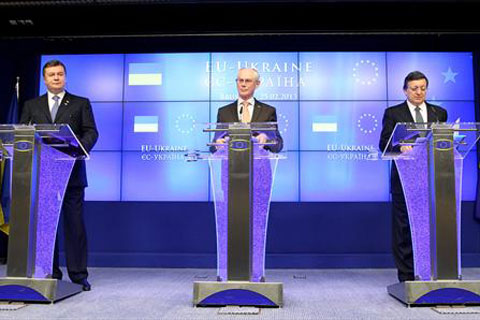The first EU-Ukraine summit took place in September 1997 in Kyiv. President Leonid Kuchma confirmed Ukraine’s European choice in line with the Partnership and Cooperation Agreement signed in 1992. An agreement was signed between the European Coal and Steel Community and the Ukrainian government on trade in steel products. Another outcome was Ukraine's waiving visa requirement for diplomatic passport holders from EU member countries.
The second summit took place in October 1998 in Vienna where Ukraine-EU relations were defined as a “strategic and unique partnership”. For the first time ever, Ukraine declared its desire to acquire associate membership in the EU.
READ ALSO: Taking a Break as a Strategy
The third EU-Ukraine summit was held in July 1999, a year when presidential elections were being held in Ukraine. The EU confirmed its intention to facilitate Ukraine’s accession to the WTO. Work began to aim for establishing a free-trade zone between Ukraine and the EU.
The fourth summit, held in September 2000, was later dubbed a “diplomatic curtsey” by observers. They referred to statements that Ukraine would become an associate member of the EU as soon as that same year. The EU confirmed its support for reform in Ukraine. A joint statement, signed by European Commission President Romano Prodi, French President Jacques Chirac and Ukrainian President Leonid Kuchma, envisaged further strengthening of cooperation as a significant contribution to securing peace, stability and prosperity in Europe.
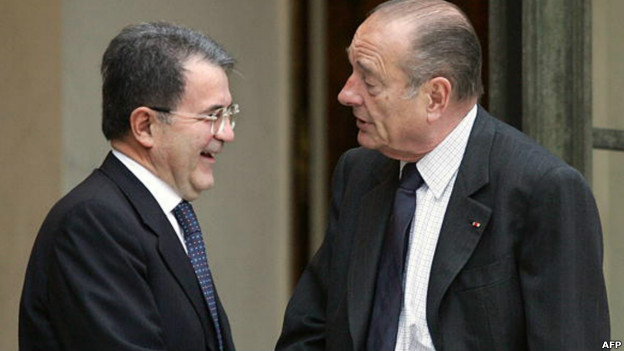
The fifth EU-Ukraine summit took place in September 2001 in Yalta against the backdrop of the Cassette Scandal, a year after the disappearance of the journalist Georgiy Gongadze. EU representatives began speaking about the Ukrainian government interfering with the mass media and other failures to meet democratic standards. In turn, the Ukrainian government pointed out that the EU had failed to make good on its old promises: financing the closure of the Chornobyl nuclear power plant and building compensating generation capacity at the Khmelnytsky and Rivne nuclear power plants. Ukraine also wanted to agree on cooperation in power engineering, oil and gas transit and on setting up a consortium to operate the Odesa-Brody pipeline. However, the Yalta summit fell short of Kyiv’s expectations.
The sixth summit, which took place in Copenhagen in July 2002, was described by representatives of the Ukrainian government as the first attempt to formalize EU-Ukraine relations. At this summit, Kuchma announced Ukraine’s key plans: signing an association agreement with the EU by 2003-2004, negotiating a free-trade area, fulfilling all the requirements needed for the association agreement to enter into force by 2004-2007, creating a customs union with the EU by 2005-2007 and meeting all EU membership requirements by 2007-2011. However, the EU only signed an agreement on cooperation in science and technology and welcomed the democratic procedure of the parliamentary elections in Ukraine in which Nasha Ukraina (Our Ukraine) headed by Viktor Yushchenko emerged as the winner.
The seventh summit was held in Yalta in October 2003. A new expansion wave had just been completed by the EU, and Ukraine hoped to see a more definite European position on its future. Kuchma said that Kyiv wanted to agree on clear-cut plans for Ukraine to acquire the status of a market economy and on simplifying visa requirements for Ukrainian citizens. The summit was preceded by the April 2003 European Conference at which the programme “Wider Europe – Neighbourhood: A New Framework for Relations with our Eastern and Southern Neighbours” was presented. In fact, the EU did not offer Ukraine membership candidacy but rather the status of a neighbourhood country within the European Neighbourhood Policy. Kuchma established Europe Day in Ukraine that same year.
Contrary to Kyiv’s expectations, the eighth summit (the Hague, July 2004) failed to produce a finalized EU-Ukraine cooperation plan. Kyiv continued to insist on including a provision about closer relations with the EU after the Action Plan was fulfilled, but Brussels did not consent. President of the European Commission Prodi declared that the EU was ready to cooperate with Ukraine only within the European Neighbourhood Policy adopted in 2003. “This policy is not linked to EU membership – this issue is as yet not on the agenda,” Prodi said. President Kuchma also failed to obtain the status of a market economy for Ukraine. At the same time, EU officials emphasized that the Ukrainian leadership had to “secure a democratic procedure of the presidential elections in October 2004.”
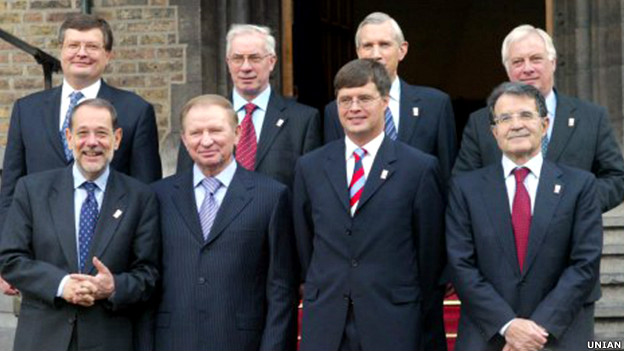
The ninth summit, held in December 2005 in Kyiv, is believed to be one of the most successful ones in developing EU-Ukraine relations. Newly elected President Yushchenko enjoyed a high level of trust within the EU, and as a result Kyiv obtained a number of preferences. A decision was adopted to grant Ukraine the status of a market economy in the context of the EU’s antidumping legislation. Cooperation agreements in aircraft engineering, navigation and energy industries were also signed. The EU also promised to support Ukraine on its way to EU membership. Representatives of Ukraine and the EU – British premier Tony Blair, EU High Representative Javier Solana and European Commission President José Manuel Barroso released a joint statement, pointing out that “democracy and reforms have opened new prospects for Ukraine and its relations with the EU.” The EU confirmed its intention to start preliminary consultations on a new EU-Ukraine agreement that would replace the Agreement on Partnership and Cooperation.
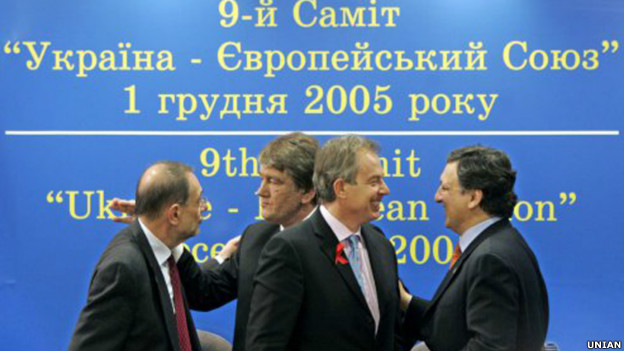
At the 10th summit, which took place in October 2006 in Helsinki, EU representatives declared that Europe was ready to start the negotiation process to set up a free-trade area between Ukraine and the EU and discuss the format of a new agreement. Yushchenko stressed that Kyiv was interested in having provisions on “political association and economic integration” incorporated in the text of the new basic Ukraine-EU agreement. The parties also discussed agreements on simplifying visa requirements, cooperation in the energy sector and a common foreign and security policy. The Agreement on Readmission was initialled at the summit under which migrants who illegally came from Ukraine to the EU countries were forced to return. In exchange, some categories of Ukrainian citizens were granted more liberal EU visa requirements. At the same time, the EU expressed its concern about the frequent government replacements in Ukraine. By then, Yulia Tymoshenko was no longer the prime minister of Ukraine.
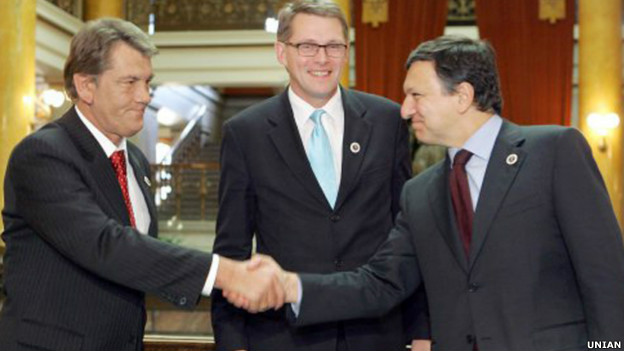
At the 11th summit in September 2007 in Kyiv, political leaders noted that a key stepping stone in Ukraine-EU relations was the start of negotiations on a new, enhanced Agreement and a Deep and Comprehensive Free-Trade Area Agreement. Specific measures to improve nuclear security in Ukraine, particularly the completion of stabilization measures at the Sarcophagus in Chornobyl, were noted. The sides agreed to carry out a joint evaluation of the security of Ukraine’s nuclear power reactors.
READ ALSO: Amanda Paul: I would be very surprised if Ukraine managed to accomplish all the tasks 100%
At the 12th summit, which was held in September 2008 in Paris, a compromise decision was reached on the title of a new enhanced agreement – Association Agreement. The sides also agreed to launch dialogue in order to define conditions for visa-free travel of Ukrainians to the EU. Negotiations on the free-trade area were reported to be making rapid progress in “a very constructive atmosphere”. “In the context of negotiations between the EU and Ukraine, the presidents hope that the ambitious Association Agreement will be completed quickly and signed as quickly as possible,” a joint statement by Yushchenko, Barroso, and French President Nicolas Sarkozy read.
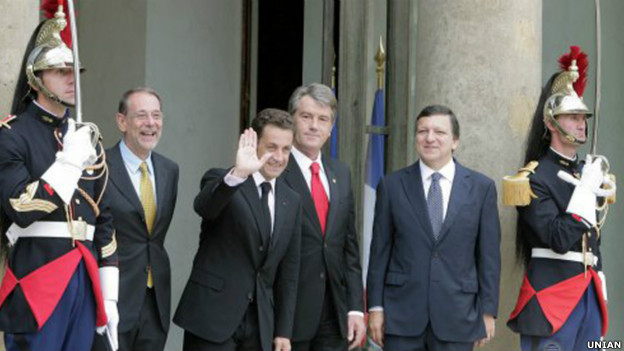
In December 2009, at the 13th summit, where Ukraine was for the last time represented by Yushchenko, the sides recognized that work on the majority of provisions in the Association Agreement had been completed. Barroso expressed hope that negotiations on association could be completed by the end of 2010. At the same time, he spoke about disappointment with the actions of the Ukrainian government. “I will be honest with you, Mr. President. It very often seems to us that the promise of reforms is fulfilled in part only, commitments to reforms are fulfilled only in part, and words are not always accompanied by deeds,” he said. Experts pointed to the confrontation between Yushchenko and Prime Minister Tymoshenko as the cause for delayed reforms.
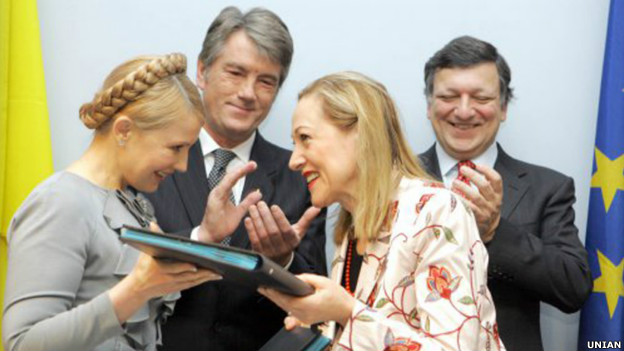
The 14th summit in Brussels, held in November 2010, was the first one attended by President Viktor Yanukovych. At the time, the Prosecutor General’s Office had already pressed charges against Tymoshenko in the “gas case”. An action plan to introduce visa-free travel was presented at the summit. It consisted of 60 points and envisioned passing new laws or updating existing ones in 15 areas, as well as developing seven national strategies. President of the European Council Herman von Rompuy and European Commission President Barroso noted the progress Ukraine had made in relations with the EU but also stressed that Ukraine had to fulfil all conditions related to the visa policy. The sides reconfirmed a joint commitment to set up a free-trade zone between Ukraine and the EU to secure Ukraine’s gradual integration in the EU’s internal market.
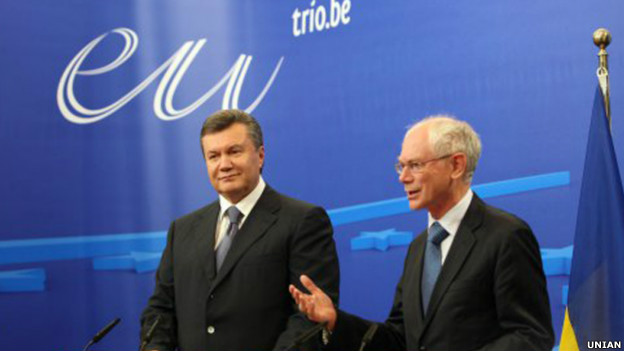
At the 15th summit in December 2011, Barroso and Rompuy emphasized in a document approved by Kyiv that Ukraine’s signing and ratification of the Association Agreement would hinge on the state of democracy in Ukraine. By this time, Tymoshenko had been sentenced to seven years in prison. “We want to take steps to sign and ratify the Association Agreement as soon as we can, but this will depend on political circumstances. In this regard, a number of recent domestic developments in Ukraine have led to a difficult atmosphere between the European Union and Ukraine,” Rompuy said. At the same time, EU representatives noted that the way for technical preparation of the Association Agreement between Ukraine and the EU, including the free-trade area, was open, but further progress was in the hands of the Ukrainian government.
READ ALSO: European politicians feel that Ukrainian authorities are mucking them about
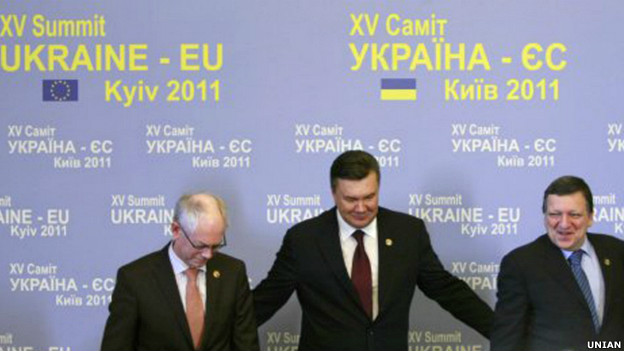
At the 16th summit, which took place on 25 February 2013 in Brussels, following talks between Yanukovych and EU leadership, a joint statement was released which said that Ukraine was “determined to comply” with the prerequisites set by the EU for the signing of the Association Agreement, including a Deep and Comprehensive Free-Trade Area. The document says that “the leaders took note of the actions taken so far by Ukraine, and looked forward to it achieving concrete progress by early May 2013.” Yanukovych announced that he was satisfied with the outcome of the summit.
